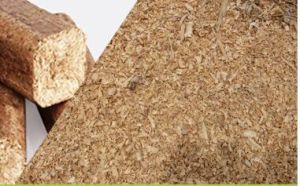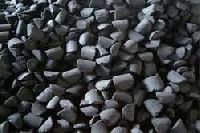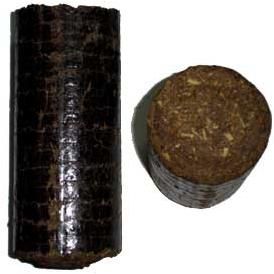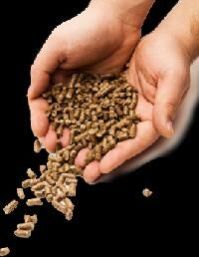
Wood Briquettes
Wood briquettes are made of dry, untreated wood chips (e.g. wood shavings). They are pressed with high pressure without any binder. By compacting the wood with this high pressure, it turns into a fuel like brown coal. The advantages of the wood briquettes are that they have a lower ash and sulfur content, compared to the fossil fuels. The carbon dioxide (CO2) balance is even, because wood briquettes release just as much CO2 to the atmosphere as the tree absorbs through growth by photosynthesis. In addition, briquettes have substantially higher BTU value per cubic foot due to their density which means less storage space and more heat released per kg.
...more
Sawdust Briquettes
A popular form of biomass briquettes emerging in developed countries is called Sawdust Briquettes. It takes the waste by-product of saw mills such as sawdust, compresses it and then extrudes it to make a reconstituted log that can replace firewood. There are no binders involved in this process. The natural lignin in the wood binds the particles of wood together to form a solid. Burning a Sawdust Briquettes is far more efficient than burning firewood. Moisture content of a briquette can be as low as 4%, whereas that of firewood may be as high as 60%
...more
Recycled Briquettes
Refuse-derived fuel (RDF) or solid recovered fuel/ specified recovered fuel (SRF) is a fuel produced by shredding and dehydrating municipal solid waste (MSW) with a converter technology. RDF consists largely of combustible components of municipal waste such as plastics, textile, leather, corrugated boxes and biomass. The RDF is recovered by subjecting the incoming the fresh mixed municipal solid waste through a series of electro-mechanical unit operations, which include pre-sorting of pre-defined waste components, shredding of waste into defined sizes, removal of inerts through air-density separator, removal of ferrous components using Magnetic separator, followed by secondary shredding(subject to customer’s requirement) and formation of bales/briquettes. Physico-chemical Composition of Refuse derived Fuel The refuse derived fuel, prepared from municipal solid waste offers excellent characteristics similar to biomass fuel and offers a environment and financially sound option for industries for replacement of conventional fuels, such as coal, oil etc. The fuel characteristics of Refuse derived fuel offered by us are as follows: At present, the RDF is being offered in loose fluff and baled form. The offered size range is +35mm and -35 to +16mm. The above reported values are similar to D-grade coal and can be used in industries, which extensively use conventional fuels like coal and non-conventional fuels like biomass. The advantage of using RDF over biomass fuel lies in the fact that RDF is buffered against seasonal cost fluctuations and does not require any advance procurement like biomass. RDF can be supplied with customer tailored specifications. ENVIRONMENTAL BENEFITS OF USING RDF RDF by virtue of its close composition with coal and biomass fuels offers an environmentally sustainable solution to industries, who are concerned with simultaneous reduction of Green House Gas (GHG) emissions with operational cost optimization and maintenance of eco-friendly image among their customers. RDF is normally recommended for use by industries, which have a stringent air pollution control systems.
...more
Coal Briquettes
White coal or White coal Briquettes is a form of fuel produced by drying chopped wood over a fire. It differs from charcoal which is carbonised wood. It produces more heat than green wood. Nowadays white coal is made from Groundnut shells, Cotton hulls and salks, Castor seed shells, Forest leaves; wood chips and shavings, Sugarcane bagasse, Rice husk and paddy straw, Mustard waste, Coir dust, Coffee husk, Sunflower waste, Maize stalks, Bajra cobs, Sesame seeds oil cake, Wheat straw, etc.
...more
Biomass Briquettes
Biomass briquettes are made from agricultural and forest waste and are a replacement for fossil fuels such as oil or coal, and can be used to heat boilers in manufacturing plants. They have a widespread application in developing countries. Biomass briquettes are a renewable source of energy and they avoid emissive addition of fossil carbon to the atmosphere. A number of companies in India have switched from furnace oil to biomass briquettes to save costs on boiler fuels. The use of biomass briquettes is predominant in various parts of India, where coal and furnace oil are being replaced by biomass briquettes. Biomass briquettes also provide more calorific value/kg and save around 30-40 percent of boiler fuel costs. Use of biomass briquettes can earn Carbon Credits for reducing emissions in the atmosphere.
...more
agricultural waste

Biomass Briquette

Mustard Stalk

Saw Dust

boiler operation optimization service
Be first to Rate
Rate ThisOpening Hours